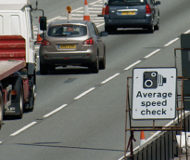Article from: www.thenewspaper.com/news/41/4106.asp
5/22/2013
Maryland, UK: Complaints Upheld Against Speed Camera Operators
UK agency blasts speed camera firm for bogus safety claims. Maryland board rules Baltimore camera task force violated state law.
 Members of the public are having success holding speed camera companies and their customers accountable. This week, governmental agencies in England and Maryland upheld citizen complaints against the proponents of automated ticketing.
Members of the public are having success holding speed camera companies and their customers accountable. This week, governmental agencies in England and Maryland upheld citizen complaints against the proponents of automated ticketing.
On Wednesday, the UK Advertising Standards Authority (ASA), an independent government agency that enforces UK laws against false advertising, announced the speed camera firm Vysionics had agreed to drop from all future advertising material its claim that photo enforcement caused a 70 percent reduction in accidents. The authority looked into the matter after Malcom Heymer with the Alliance of British Drivers (ABD) lodged an objection in February.
"In a formal investigation, if the ASA Council decides that an ad is in breach of the code, the advertisers are told to withdraw or amend it," ASA investigations executive Simon Lane wrote in a response to Heymer (![]() view ASA ruling, 85k PDF). "Because Vysionics have already assured us that the advertising you complained about will be amended in the future, we consider there is little to be gained from continuing with a formal investigation, which would achieve that same outcome."
view ASA ruling, 85k PDF). "Because Vysionics have already assured us that the advertising you complained about will be amended in the future, we consider there is little to be gained from continuing with a formal investigation, which would achieve that same outcome."
The British motorist rights group was pleased that the watchdog agency has once again objected to the statistics used to market photo enforcement. In 2006, the agency ruled against a speed camera pamphlet issued by Greater Manchester. In 2005, it agreed that West Yorkshire speed camera operator used bogus statistics in a poster.
"This is long overdue recognition that the claims of the whole speed enforcement industry are exaggerated and self-serving," ABD deputy chairman Brian Gregory said in a statement. "The huge increase in speeding penalties in recent years has contributed nothing to the downward trend in casualties which, since 2008, has been largely due to the economic downturn."
On Monday, Maryland's Open Meetings Compliance Board found the city of Baltimore guilty of violating state law regarding the meetings of a speed camera advisory task force, siding with a complaint filed by the Maryland Drivers Alliance. The board upheld the complaint on all three grounds: the task force excluded the public from meetings, it failed to maintain minutes and it did not give proper notice of meetings.
The board stated there were no notices posted on the city's transportation department website. It also blasted the "minutes" that the task force produced after the fact as wholly inadequate.
"The 'minutes' of the November and January meetings contain only the agenda and the words 'No actions were taken,'" the board ruled. "The method by which the minutes were adopted is unclear, as 'no actions were taken' at any meeting; the attendees of the meetings are not listed; the chair or other presiding officer is not identified; the presence of quorum is not stated."
On March 20, reporters for the Baltimore Sun recorded on video their exclusion from an official task force meeting at the Brekford Corporation's headquarters in Hanover. The board refused to accept the city's excuse for its actions.
"A public body must refuse to meet at a private facility when the owner will not admit the public," the board ruled. "The act would be meaningless if it were interpreted to allow public bodies to meet secretly at private facilities... Members of public bodies should be made aware at the outset that their public service includes the duty of openness, and specifically, that the public must be given a meaningful opportunity to attend their meetings."
A copy of the Maryland ruling is available in a 250k PDF file at the source link below.
Source: Baltimore Automated Enforcement System Task Force (Maryland Open Meetings Compliance Board, 5/20/2013)
Permanent Link for this item
Return to Front Page
 Members of the public are having success holding speed camera companies and their customers accountable. This week, governmental agencies in England and Maryland upheld citizen complaints against the proponents of automated ticketing.
Members of the public are having success holding speed camera companies and their customers accountable. This week, governmental agencies in England and Maryland upheld citizen complaints against the proponents of automated ticketing.